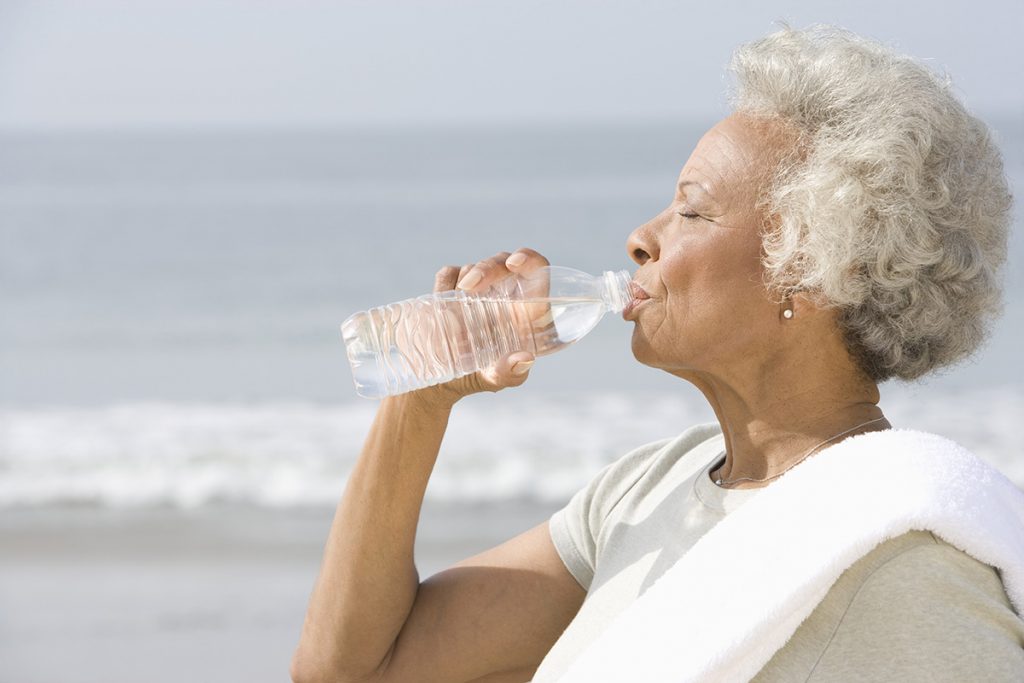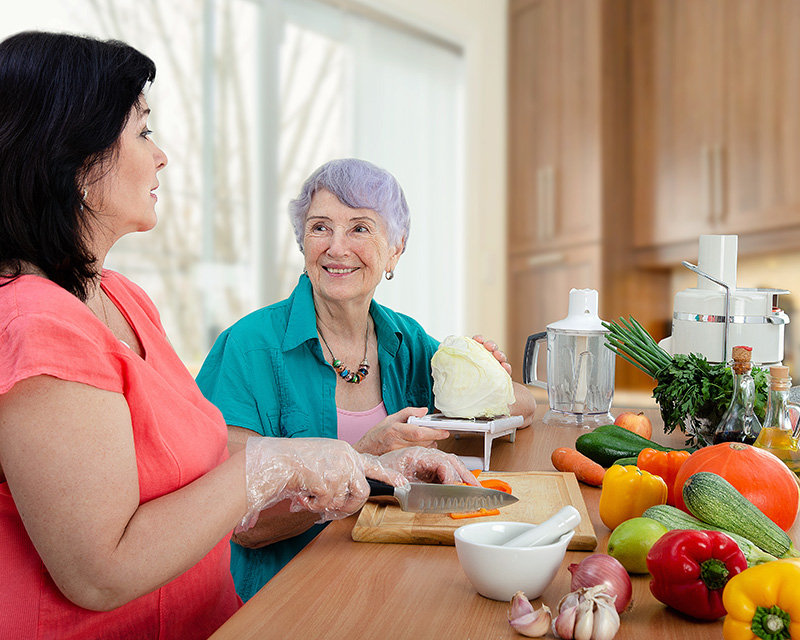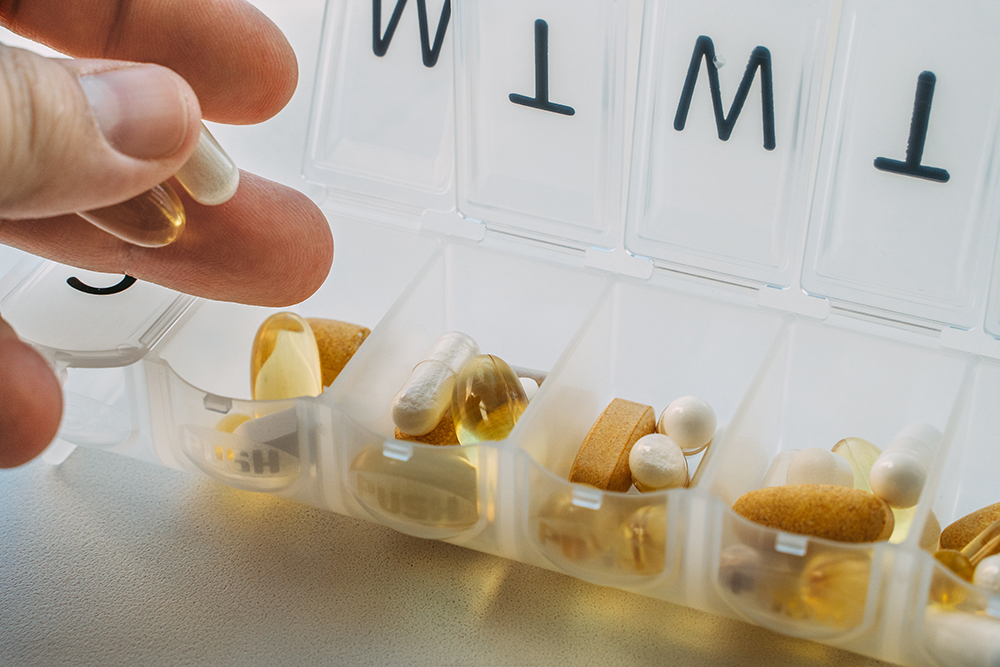Summer’s Bounty
It can be tough to eat enough fruits and vegetables for anyone. Growing older can make proper nutrition even more difficult. Here are some tips to get the most out of summer’s bounty of fruits and vegetables.
- Shop Farmers’ Markets – Get out. Walk about. Take home some fresh fruits and vegetables
- Use Herbs – Add dill, thyme and rosemary to vegetables. They are packed with flavor and nutrition. You can grow them at home, too, and have fresh herbs at your fingertips all summer.
- Get Grilling! – Marinate meats and veggies in plastic bags then toss on the grill!
- Freeze Fruit – Don’t worry about overbuying fruit at the farmer’s market. Fruit freezes beautifully! Pack ziploc bags with fruits like strawberries and blueberries for snacks or a morning smoothie.
Eating Right
As we age, “eating right” can make a difference in our health and how we feel and encourage a sense of well-being.
What do we mean by “eating right?” We need good nutrition for energy to meet the day’s activities. We also need a certain number of calories to maintain proper weight. Plus our body needs important nutrients to maintain proper function. This includes nutrients such at potassium, Vitamin B-12, calcium, Vitamin D, minerals and dietary fiber. When you consume foods rich in these nutrients and vitamins, you are eating right!
It’s not only about avoiding high-fat, high-sugar foods. Avoiding excessive amounts of these is certainly good. But to reduce the risk of developing chronic diseases or to manage existing chronic diseases like diabetes, hypertension and heart disease, you need to eat right.
Are You Hydrated?
The body is normally made up of 60% water which falls to about 50% in seniors. Seniors drink less water because the sense of thirst decreases with age. Secondly, aging kidneys have decreased ability to concentrate urine. As a result, seniors are at risk for dehydration.
Water Is Important to Good Health
- Drink fluids throughout the day in order to avoid:
- Memory/cognition problems
- Constipation problems.
- Muscle weakness and cramps
Medications may cause dehydration like some blood pressure and anti-depression medications. So, is it necessary to drink eight 8-ounce glasses of water daily? Maybe not because other medications retain water. Also fruits and vegetables contain fluids which keep you hydrated.
Dehydration Symptoms
Dry, sticky mouth, muscle weakness, headache, sleepiness or tiredness.
Getting Proper Nutrition?
Proper nutrition aids the function of the digestive, circulatory and nervous systems. It can ward off potential health problems like diabetes, high blood pressure and high cholesterol.
Because your metabolism slows with age, it is important that the calories we take in, are from nutrient-rich foods.
- Healthy fats (seeds, nuts, avocados, fatty fish and vegetable oils) improve heart health.
- Whole Grains (brown rice, whole grain cereals and whole wheat bread) reduce blood cholesterol and are a good source of B Vitamins.
- Fiber (raw fruits and vegetables) aids digestion and helps alleviate constipation.
- Protein (beans, eggs, chicken, fish and lean meats) strengthens the immune system and muscles.
- Low-fat dairy foods (cheese, yogurt and milk) builds bones, teeth and red blood cell production
Remember, healthy eating will also help you maintain a healthy weight and will work wonders for your energy level.
Protein Is Good For You
- Consume more protein to lower your risk of infections, pressure sores, falls and broken bones.
- Plus eating more protein and fewer carbohydrates may lose some extra pounds.
- How much protein should I eat?
- Women should aim for 45 grams of protein per day. Men should get 60 grams. Speaking with a dietician may be helpful.
- For reference, one egg white has 7 grams of protein, 1 string cheese has 8 grams, and a can of tuna or chicken has close to 40 grams.
- Vitamin K has long been understood to play a key role
Who needs Vitamin K?
in blood clotting. It was discovered by a Danish biochemist in the 1920’s because it helped prevent excessive bleeding after an injury. The “K” comes from the Danish and German word koagulation. People who take a blood thinner like warfarin (Coumadin) are advised to keep a steady intake of Vitamin K so their medication can work more effectively.
Vitamin K has also been shown to slow the buildup of calcium in blood vessels, bone and other body tissue that happens with aging. This buildup can lead to coronary heart disease in your arteries, or osteoarthritis in your joints.
Spinach, kale and broccoli are the best sources of Vitamin K. But Vitamin K is also found in soy beans, pumpkin, okra and blueberries.
Benefits of Vitamin D
Seniors are at risk for a deficiency of Vitamin D due to less sun exposure, decreased kidney function and changes in intestinal absorption. According to the National Institutes of Health (NIH), Vitamin D deficiency can lead to osteomalacia (softening of the bones), muscle weakness and increased risk of falls and fractures. Vitamin D helps the body absorb calcium which is essential for strong bones. Seniors are also at greater risk for osteoporosis, so getting adequate Vitamin D is very important.
In addition Vitamin D supports immune health. If you are worried about getting respiratory infections, add Vitamin D to your diet to ward off these infections.
Get Your B12
B12 is needed for a healthy nervous and cardiovascular systems. B12 is found in shellfish, beef liver, fish, bran cereals, red meat, cheese and eggs. Lack of B12 has also been associated with memory and cognitive problems. B12 deficiencies can be corrected with diet, supplements and injections.
Sunny Days Are Here!
- Put out a bird feeder and do some birdwatching. Colorful birds appear as the weather warms.
- Take a walk outside and get some fresh air and sunshine. If you are not too mobile, just do some sitting outside in the sunshine. Be sure to dress wisely. You might need a light jacket or hat and scarf.
- Plan a time when the sun is shining to eat a healthy picnic lunch outdoors. Invite a friend to join you.
- Go on a field trip to a local farmer’s market. Stroll through and shop fresh produce and flowers.
Whole Grains
Decoding The Labels
You probably know that fiber helps keep your digestive system moving, feeds healthy bacteria in your gut, and can help lower cholesterol. Many whole grains (quinoa, barley, oats and farro) contain different combinations of zinc, manganese, folate, magnesium, copper, thiamin, niacin, vitamin B6, phosphorus, selenium, riboflavin and vitamin A.
Even if you know whole grains are a healthy choice, it can be hard to tell which products contain whole grains and which are just pretending they do.
100% Whole Grains
The only label that means 100% of the grains used are whole grains.
High Fiber or Excellent Source of Fiber
Contains at least 20% (around 5 grams) of your daily fiber requirement.
Good Source of Fiber
Contains 10-19% of the daily fiber requirement (around 2.5 – 5 grams).
Organic
At least 95% of the ingredients are certified organic (don’t use pesticides or other chemicals).
Whole Grain or Whole Wheat
At least 51% of the grains used are whole grains.
Made with Whole Grains
This term doesn’t mean much since a most of the grains could be refined.
Multigrain
This term simply means it’s made with more than one type of grain, but they might be refined.









Comments are closed.